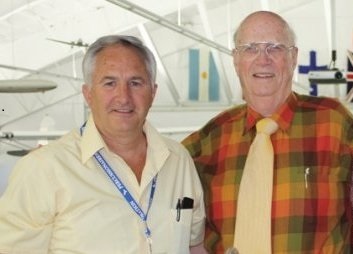 Dana Oakes, left, with his hero in the profession, the legendary Dr. Forrest Bird.
Dana Oakes, left, with his hero in the profession, the legendary Dr. Forrest Bird.If you just walked across the stage to accept your diploma from respiratory care school, you are no doubt ready to leave the classroom behind, at least for a while.
But in a profession like respiratory care, that is not possible. Most likely your license to practice requires annual or bi-annual continuing education credits, and your hospital will be calling on you to participate in facility-specific continuing education as well.
In the following interview, AARC member Dana Oakes, BA, RRT-NPS, publisher of the popular Medical Pocket Guides for respiratory therapists, offers his take on lifelong learning in respiratory care —
Many new grads get out of school thinking they know everything they need to know about practicing in the profession. What would you like to tell them about the fallacy of that assumption?
Dana Oakes: Haha…I learned more the first year of practice than I did in my two years in school!
What should new grads be doing at the beginning of their careers to foster a mindset of lifelong learning, and why is it important to set a high bar for continuing ed from the outset?
Dana Oakes: The bar? You should strive to become the doctor’s very best friend — i.e., saving his butt and making him look good on a daily basis. That will take a lot of training.
Most state licensure boards require continuing education credits. Do you think that is enough to keep RTs up-to-date on changes in the field?
Dana Oakes: Not enough. I believe each therapist should strive to learn and know as much or more about the patient, disease, and treatment as the doctor does. This will require intensive self-study.
It can be tough for some folks to fit continuing education into an already busy work and family life. What strategies can you offer to help ensure continuing ed doesn’t get sidetracked by other things in life?
Dana Oakes: Purpose! One can always make time for the important things in life, and there is a saying that if you want something done, give it to a busy person. Most people waste time on things like digital games, Facebook, etc. Professionals make the time.
What do you believe are the chief benefits of lifelong learning for the respiratory therapist, both clinically speaking and in terms of furthering their careers?
Dana Oakes: Being the best trained and learned professional you can be is not an option in today’s world — it is a requirement. Lives depend on you and saving lives is one of the biggest benefits one can get out of life! You will never regret that when you get old — like me! I believe respiratory therapy can be one of the very best professions in life. It has been for me for 41 years.





